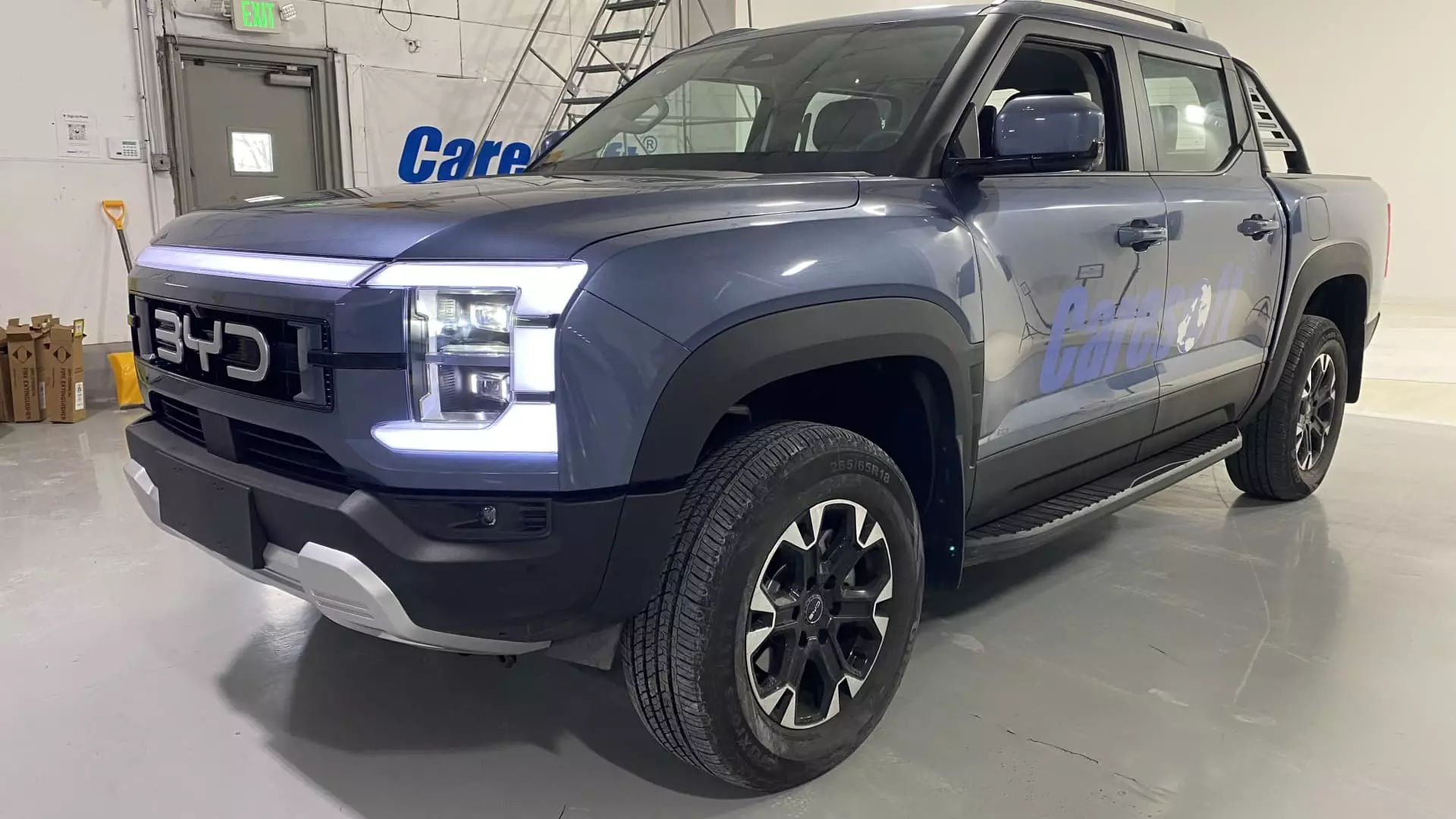As American automakers grapple with the complexities of a dynamic global market, the emergence of Chinese manufacturers, particularly BYD Auto, signals a significant shift in the automotive landscape. The introduction of the BYD Shark, a midsize pickup truck that resembles popular American models, raises concerns among established players like Ford and Toyota. This article delves into the implications of BYD’s entry into the pickup segment, exploring design similarities, market strategies, and the broader impact on traditional automaking giants.
The BYD Shark’s exterior features a striking resemblance to well-known American pickups, particularly the Ford F-150, which has dominated sales in the U.S. for decades. This mimetic design strategy constitutes both a risk and an opportunity. On one hand, creating a vehicle that echoes the aesthetics of successful American models could attract consumers by invoking familiarity and trust. However, it may also attract scrutiny and accusations of imitation from competitors who have spent years establishing their brands and designs in the American market.
BYD leverages its innovative prowess through a unique hybrid powertrain, combining electric vehicle components with a compact internal combustion engine. This hybrid system aims to maximize fuel efficiency while maintaining functionality—a clear response to growing consumer demand for environmentally friendly vehicles without sacrificing power. Nonetheless, the Shark’s design and functionality also raise questions about long-term reliability and performance, particularly in a market accustomed to the refined engineering found in traditional American trucks.
For decades, pickup trucks have been the cornerstone of profitability for American automakers. The competitive dynamics have grown increasingly intense as international players enter the fray. Despite BYD’s claim that it has no immediate plans to sell the Shark in the U.S., its aggressive expansion into countries like Australia, Brazil, and Mexico serves as a testing ground for its products.
Sales figures tell a compelling story. In 2024 alone, BYD exported over 10,000 Shark models, contributing to the company’s robust growth trajectory, which saw it capture an increased share of vehicle exports from China. It has significantly ramped up production, indicating a readiness to compete on a global scale. This poses a substantial challenge for American and Japanese automakers who must now not only defend their market prominence but also innovate rapidly to counteract the influx of competitive offerings.
In light of rising competition from BYD and other Chinese manufacturers, traditional automakers like Ford and Toyota must recalibrate their strategies. Ford’s CEO, Jim Farley, articulated the importance of competing in the global market—a sentiment echoed by Toyota’s Chairman Akio Toyoda, who emphasized the need for flexibility and responsiveness to diverse consumer needs. The stakes are particularly high; pickup trucks represent a substantial revenue stream, so losing market share could have dire financial repercussions.
The BYD Shark’s pricing positions it as a potential disruptor, particularly since it starts at a relatively modest figure in comparison to other hybrids and electric trucks sold in the U.S. market. This competitive price point could entice budget-conscious consumers looking for effective, reliable transportation without the premium price tag typically associated with hybrid or electric vehicles.
While the initial reception to the BYD Shark has been positive, it remains to be seen whether the truck can maintain the high standards of quality and performance expected by consumers in North America. Analysts have pointed out that beyond design and pricing, the real challenge will be achieving the same level of build quality as established competitors. Issues highlighted by experts such as Terry Woychowski indicate that certain aspects of the Shark’s design, such as rear seat functionality and overall ride handling, require refinement to meet American consumers’ expectations.
Furthermore, introducing a new model into the U.S. market involves navigating complex safety regulations and consumer preferences—the battleground where many imported models have historically faltered. Success will depend not just on the vehicle’s features but also on BYD’s proficiency in adapting to a market characterized by loyalty and brand recognition.
As BYD Auto advances with its Shark model, the ramifications for the global automotive market are profound. This development embodies a shift toward increased competition and diversification in the pickup truck segment, traditionally dominated by American and Japanese manufacturers. While concerns about quality and consumer acceptance remain valid, the determination of companies like BYD to innovate and provide cost-effective alternatives may redefine market dynamics.
Ultimately, the emergence of formidable competitors like BYD and its Shark pickup truck forces established automakers to rethink their strategies, adapt swiftly, and focus on quality to maintain their share of this lucrative market. Only time will reveal whether American pickups can fend off the threat posed by a rising tide of well-engineered, affordable Chinese vehicles, or whether a new era in the automotive industry is dawning.

